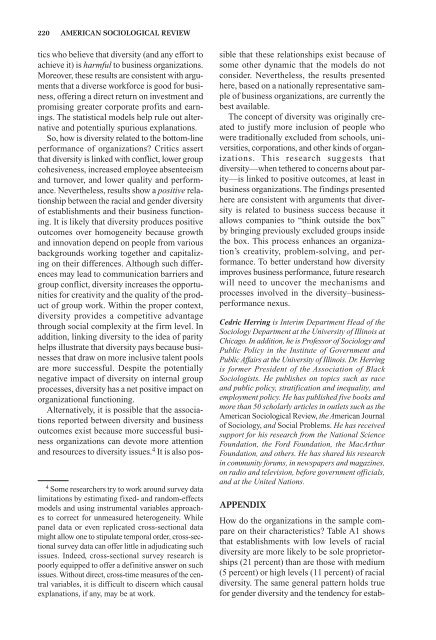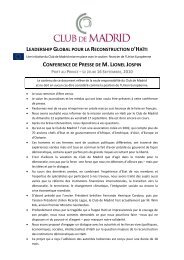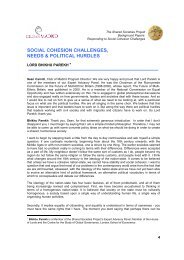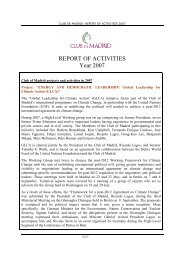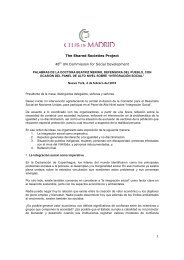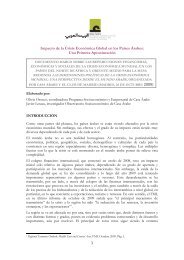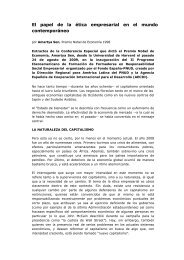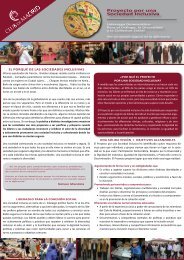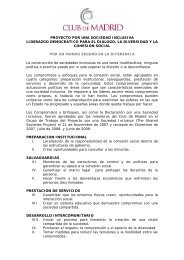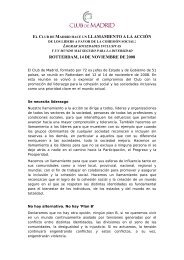Does Diversity Pay? - American Sociological Association
Does Diversity Pay? - American Sociological Association
Does Diversity Pay? - American Sociological Association
You also want an ePaper? Increase the reach of your titles
YUMPU automatically turns print PDFs into web optimized ePapers that Google loves.
220—–AMERICAN SOCIOLOGICAL REVIEW<br />
4 Some researchers try to work around survey data<br />
limitations by estimating fixed- and random-effects<br />
models and using instrumental variables approaches<br />
to correct for unmeasured heterogeneity. While<br />
panel data or even replicated cross-sectional data<br />
might allow one to stipulate temporal order, cross-sectional<br />
survey data can offer little in adjudicating such<br />
issues. Indeed, cross-sectional survey research is<br />
poorly equipped to offer a definitive answer on such<br />
issues. Without direct, cross-time measures of the central<br />
variables, it is difficult to discern which causal<br />
explanations, if any, may be at work.<br />
tics who believe that diversity (and any effort to<br />
achieve it) is harmful to business organizations.<br />
Moreover, these results are consistent with arguments<br />
that a diverse workforce is good for business,<br />
offering a direct return on investment and<br />
promising greater corporate profits and earnings.<br />
The statistical models help rule out alternative<br />
and potentially spurious explanations.<br />
So, how is diversity related to the bottom-line<br />
performance of organizations? Critics assert<br />
that diversity is linked with conflict, lower group<br />
cohesiveness, increased employee absenteeism<br />
and turnover, and lower quality and performance.<br />
Nevertheless, results show a positive relationship<br />
between the racial and gender diversity<br />
of establishments and their business functioning.<br />
It is likely that diversity produces positive<br />
outcomes over homogeneity because growth<br />
and innovation depend on people from various<br />
backgrounds working together and capitalizing<br />
on their differences. Although such differences<br />
may lead to communication barriers and<br />
group conflict, diversity increases the opportunities<br />
for creativity and the quality of the product<br />
of group work. Within the proper context,<br />
diversity provides a competitive advantage<br />
through social complexity at the firm level. In<br />
addition, linking diversity to the idea of parity<br />
helps illustrate that diversity pays because businesses<br />
that draw on more inclusive talent pools<br />
are more successful. Despite the potentially<br />
negative impact of diversity on internal group<br />
processes, diversity has a net positive impact on<br />
organizational functioning.<br />
Alternatively, it is possible that the associations<br />
reported between diversity and business<br />
outcomes exist because more successful business<br />
organizations can devote more attention<br />
and resources to diversity issues. 4 It is also possible<br />
that these relationships exist because of<br />
some other dynamic that the models do not<br />
consider. Nevertheless, the results presented<br />
here, based on a nationally representative sample<br />
of business organizations, are currently the<br />
best available.<br />
The concept of diversity was originally created<br />
to justify more inclusion of people who<br />
were traditionally excluded from schools, universities,<br />
corporations, and other kinds of organizations.<br />
This research suggests that<br />
diversity—when tethered to concerns about parity—is<br />
linked to positive outcomes, at least in<br />
business organizations. The findings presented<br />
here are consistent with arguments that diversity<br />
is related to business success because it<br />
allows companies to “think outside the box”<br />
by bringing previously excluded groups inside<br />
the box. This process enhances an organization’s<br />
creativity, problem-solving, and performance.<br />
To better understand how diversity<br />
improves business performance, future research<br />
will need to uncover the mechanisms and<br />
processes involved in the diversity–businessperformance<br />
nexus.<br />
Cedric Herring is Interim Department Head of the<br />
Sociology Department at the University of Illinois at<br />
Chicago. In addition, he is Professor of Sociology and<br />
Public Policy in the Institute of Government and<br />
Public Affairs at the University of Illinois. Dr. Herring<br />
is former President of the <strong>Association</strong> of Black<br />
Sociologists. He publishes on topics such as race<br />
and public policy, stratification and inequality, and<br />
employment policy. He has published five books and<br />
more than 50 scholarly articles in outlets such as the<br />
<strong>American</strong> <strong>Sociological</strong> Review, the <strong>American</strong> Journal<br />
of Sociology, and Social Problems. He has received<br />
support for his research from the National Science<br />
Foundation, the Ford Foundation, the MacArthur<br />
Foundation, and others. He has shared his research<br />
in community forums, in newspapers and magazines,<br />
on radio and television, before government officials,<br />
and at the United Nations.<br />
APPENDIX<br />
How do the organizations in the sample compare<br />
on their characteristics? Table A1 shows<br />
that establishments with low levels of racial<br />
diversity are more likely to be sole proprietorships<br />
(21 percent) than are those with medium<br />
(5 percent) or high levels (11 percent) of racial<br />
diversity. The same general pattern holds true<br />
for gender diversity and the tendency for estab-


